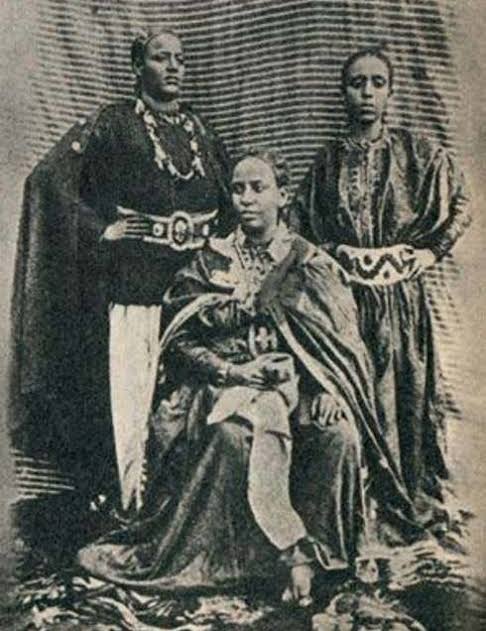Africa Boasts of numerous warrior Queens who fought against colonialism and imperialism, one of which is the Ethiopian Empress Taytu Betul who was referred to as “stubborn woman” by the Italian Forces. She was an important contributor to the modernisation of her country, Ethiopia. She also led troops in battle and devised strategies that were crucial in defeating the Italian army in 1896.

Born around 1850, she belonged to a prominent family, descending from Emperor Susneyos and she is the third wife of Emperor Menelik II after four previous Marriages.
Taytu Betul was a loyal and respectful wife of Menelik II whom she married in 1883 when he was still King of Shewa. Their marriage was beyond romance as it was believed to be a political marriage aiming to seal alliances with the northern regions where Taytu’s family held important positions.
With Menelik’s ascent to imperial throne, Taytu Betul became empress of Ethiopia in 1889, and in that capacity became a valuable advisor to him. He would consult her prior to making important decisions and due to her intelligence and loyalty for the throne and her country; he endorsed her views and proposals in administrative, political, military as well as foreign affairs.

Determined to protect her country and husband’s interests, she went on to play a key role in the conflict over the 1889 bilingual Treaty of Wuchale which did not say the same thing in Italian and Amharic; the Amharic version recognized the sovereignty of Ethiopia and its relationship with Italy as just a diplomatic partnership, while the Italian version made Ethiopia Italy’s protectorate.
When this deception was discovered, Taytu tore up the treaty and pushed her husband to a war against the Italians. The Italians underestimated Ethiopia and they attacked Ethiopia Via Eritrea.
Taytu made a remarkable contribution to the war effort when she proposed to besiege the Italian fort at Makelle by controlling their water supply which was approved by the Emperor. Although it was not easy to convince the Ethiopian soldiers that controlling the water source would be a more effective tactic than attacking the fort, 900 men from the Empress’s contingent went on to execute her plan.

Taytu’s plan worked and the Italians suffered from shortage of water and surrendered their partially completed fort in a city which they had occupied since 1895, to Ethiopian forces.
Throughout the assault on the Italian troops, Taytu was on the frontline in the battlefield commanding her own contingent of about 5000 infantry and 600 mounted troops.

The Empress also received and analyzed intelligence information which has been characterized as of crucial importance to the Ethiopian victory at the battle. This information enabled Ethiopian soldiers to attack the Italians at Adwa instead of Adigrat where the Italians had a well-protected military base.
When the war ended with the Battle of Adwa, the Italians suffered a humiliating defeat at the hands of a united Ethiopia. There is no doubt that Empress Taytu’s intellectual and physical contribution led to this historical victory of an indigenous African army putting a definitive stop to a colonizing nation’s efforts.
Taytu Betul is hailed as the light of Ethiopia. She built and founded the capital city of Addis Ababa. She died on The 11th February 1918.


No Comments
Pingback: Ethiopian Innovator Freweini Mebrahtu, Is CNN’s 2019 “Hero Of The Year” - My Beautiful Black Ancestry